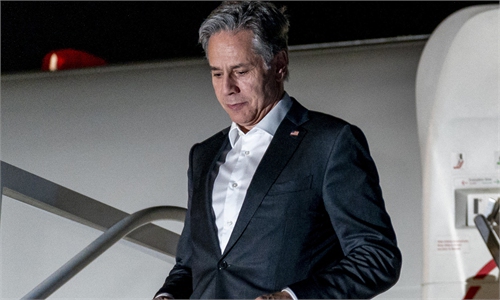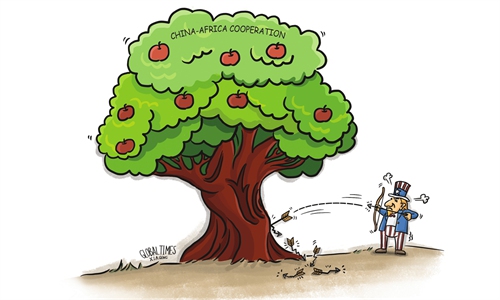
Illustration: Tang Tengfei/Global Times
US Secretary of State Antony Blinken is in South Africa on the first leg of a three-nation African trip, where he has met with South Africa's foreign minister, Naledi Pandor, and will describe a new US strategy for Sub-Saharan Africa, according to AP.
What will be included in the new strategy is unknown, but based on the current available information, the strategy is likely to be used as a tool for the US to incite Cold War to counter the so-called "Chinese and Russian influence" in Africa.
If Washington really wants to help Africa, it should provide more economic benefits to African countries. But the fact is that the US right now doesn't have enough resources to invest in the continent, with American economy recording a second straight quarter of negative growth.
Former US President Donald Trump advocated for deep cuts to America's foreign aid under his notorious "America First" approach, and more people in Africa saw the US as a selfish and unreliable partner. The Biden administration kicked off the "Prosper Africa Build Together" initiative by requesting $80 million from Congress to ramp up trade and investment between the US and Africa, but so far the initiative hasn't played a big role in shoring up local African economies.
What the US diplomacy is good at is drumming up empty rhetoric to portray good economic prospects to other countries, but actually using them as chess pieces in geopolitical games. From the Indo-Pacific Economic Framework for Prosperity (IPEF) to the US' Economic framework map toward Latin America, the concept of "freedom" and "openness" is becoming more and more common in US diplomatic rhetoric, but those economic frameworks are widely regarded as lip service due to the lack of actual economic commitment.
With an economy badly hit by the effect of the global COVID-19 pandemic, Africa currently needs economic development, instead of geopolitical gamesmanship and a Cold War mentality. However, US new strategy for Sub-Saharan Africa to a large extent can hardly meet the region's development needs.
In particular, the US has always made use of its dollar's global reserve currency status to usurp special benefits for itself. Currently, as the US Federal Reserve incessantly hikes interest rates, the dollar-denominated assets are being lured back to the US, which drive many emerging market economies, including some African economies, into severe financial trouble.
Grappling with growing challenges such as economic recession and soaring inflation at home, the US is adopting irresponsible macroeconomic policies that always send negative spillovers to global economy, hamstringing more vulnerable economies.
Since March, the Federal Reserve has increased interest rates four times, pushing up the dollar. A strengthening dollar has started to impact global capital flows and makes it more expensive for Africa countries to meet their dollar-denominated debt obligations. The risk of debt defaults has risen.
An increasing number of economists and institutions are warning that Sri Lanka might just be the beginning, as dozens of other nations are at risk of a default. Yet, while the US Representative to the United Nations (UN) Linda Thomas-Greenfield again used groundless "debt trap" accusation to smear China, a recent report showed that African countries' debts with China are merely a third of what they owe non-Chinese private lenders, according to Reuters.
Apparently, irresponsible macroeconomic policies adopted by the US have become the culprit in exacerbating economic and debt risks in Africa. If the US really cares about the economic development and people's well-being in Africa, it ought to take more responsible economic policies and avert creating debt woes for them.
The US should immediately stop smearing China and stop coercing African countries to take sides. Instead, the US needs to help relevant Africa countries tide over their economic difficulties and help African countries build long-term economic strength.
The author is a reporter with the Global Times. bizopinion@globaltimes.com.cn



